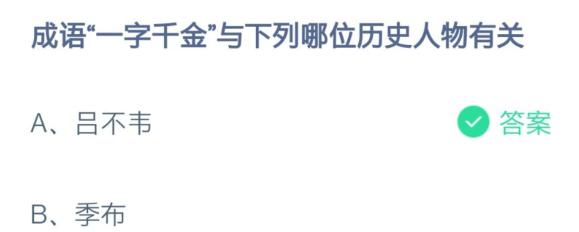On September 26, 2021, the question in Alipay's Ant Manor Mini Class was about idioms, and the question was "Which of the following historical figures is the idiom related to?" This historical figure is probably not clear to many people, let's share with you the answer of Ant Manor today.

The idiom is related to which of the following historical figures on September 26 Ant Manor Today Answer
Today's question: Which of the following historical figures is the idiom related to?
A. Lü Buwei
B. Jibu
Correct answer: Lü Buwei
Lü Buwei (?–235 BC), a Chinese politician of the Warring States period, a native of Puyang (present-day Puyangnan, Henan), was initially a great merchant, and later became a Qin Xiang, Fengwen Xinhou, and spent thirteen years in Qin. With "Confucianism and Ink and the Law of Combined Names" as the ideological center, Guangzhao Menke worked together to compile the "Lü Shi Chunqiu", systematically put forward his own political ideas, and later became one of the representative figures of the pre-Qin miscellaneous family.
During his reign, he took the lands of Zhou, Zhao, and Wei, and established Sanchuan, Taiyuan, and Dongjun, which made a major contribution to the cause of Qin Wangzheng's annexation of the Six Kingdoms. Later, he was implicated in the rebellion of the Yanyi clique, was relieved of his post as Xiangbang, and lived in a fiefdom in Henan. Soon after, The Prince of Qin ordered him to be exiled to Shu (蜀, in modern Sichuan), but he was not worried and fearful, so he died at Sanchuan Commandery (三川郡, in modern Luoyang, Henan).
Lü Buwei "attracted the heavenly disciples" during his lifetime, and there were people like Xun Quan and his students, who liked to write books and make famous in the world, so Lü Buwei instructed his diners to compile "Lü's Spring and Autumn", which was written in the Eight Commentaries, the Six Treatises, and the Twelve Chronicles, with a total of 200,000 words. After the book was completed, Lü Buwei realized that the "Lü Shi Chunqiu" already contained the facts of the ancient and modern things of heaven and earth, so he was full of confidence in the book, and published it at the xianyang city gate, on which a bounty of one thousand gold was hung, and the tourists and guests of the princely countries were invited. Lü Buwei claimed that if someone could add or delete a word to "Lü's Spring and Autumn", the reward would be thousands of gold, but no one changed it, which is the origin of "one word and a thousand gold".
Source: Webmaster's House